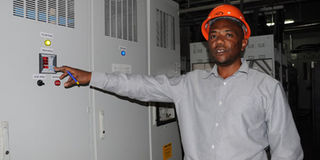Woes of local contractors

Segken Services Limited founder Sotius Segawa explains the business’ operations at a control room for a transformer at Airtel House in Kampala. PHOTO BY ERONIE KAMUKAMA
Most of Uganda’s big projects in sectors such as roads and oil, have been handled by foreign construction companies despite government’s effort to enforce the local content policy to incorporate local contractors in all these construction projects.
However, local contractors partly put the blame on themselves for not doing their job right. Engineer Arthur Bagarukayo, the managing director Precise Engineering Limited, says local contractors have been in bad records of not executing projects fully. Many also want to work on their own and want to execute everything which sometimes is not possible. In the end, they do shoddy work or completely fail to execute a particular project.
Engineer Bagarukayo says local contractors can best work when they are under joint ventures where they can make strategic partnerships.
But how many local contractors have done partnerships locally? Very few. “How will they make partnerships beyond the country with big companies in the field when they cannot even establish any here? Asked engineer Bagarukayo.
Limited skills
Local contractors possess low skills in the construction market. There is need to improve on the skills of employees. It is not bad to learn on job and engineer Bagarukayo advises that getting exposed and learning skills is not bad.
However, he urged employees too to be willing to pay their workers because these are part of the company. When a company executes a project successfully, it will be attributed to the company not an individual and this comes with paying and motivating employees.
Theft of material on sites is another issue. This is a common vice on construction sites, explaining why some buildings collapse after being raised a few months later.
Diversion of funds which leads to some projects to stale or take long to be completed is another challenge. As long as local contractors do not address such issues, engineer Bagarukayo says they stand to lose out on lucrative projects plus those they could have executed from their own government.
Difficulty in accessing bank loans
However, some contactors say despite securing the requisite legal documents to execute projects, getting financing from banks is still a nightmare. This complicates matters especially when it comes to winning trust from clients.
For those who have acquired a few projects from government, which sometimes delays to pay them but expect the work to be done in time and pay later, banks take long to approve their loans, notwithstanding the fact that they sometimes view the construction sector as risky.
According to Mr Sotius Ssegawa, the managing director Segken Services Limited, one applies for a loan in the bank and approval takes three months.
“How shall we win the trust from clients when the only hope to bail us out from this situation are the banks to provide us loans to ensure the clients projects are done and which in turn we will clear off because no bank wishes to encounter bad loans?”
However, according to the managing director of dfcu bank Mathias Katamba, banks cannot risk customers’ money to individuals who they are not sure of their businesses.
“That said, we cannot refuse to offer loans to local construction companies that have all the necessary documents and a good track of record of executing projects. Banks want to understand your capacity and how you have been executing previous projects. Have functional equipment, your company has to be registered and file tax returns and pay employees. How can I trust a loan to a person who does not pay their employees,” Mr Katamba says.
“Uganda’s construction sector has potential if more skilling is encouraged. It could be one of the areas Uganda can look to tap in terms of exports. Once we skill our own people, they can be able even to win better contracts in the neighbouring countries. As the population expands, there is need for infrastructure in form of shelter, hospitals, schools and roads among others,” adds Mr Katamba.




